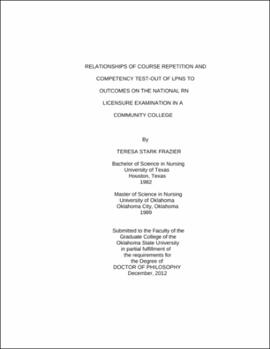| dc.contributor.advisor | Self, Mary Jo | |
| dc.contributor.author | Frazier, Teresa S. | |
| dc.date.accessioned | 2013-11-26T08:31:05Z | |
| dc.date.available | 2013-11-26T08:31:05Z | |
| dc.date.issued | 2012-12 | |
| dc.identifier.uri | https://hdl.handle.net/11244/7133 | |
| dc.description.abstract | Efforts to mitigate the nursing shortage are multiple in our country. One example is the development of nursing program formats leading to the LPN completing curriculum at an accelerated pace. A Midwestern state community college offers such a format as the LPN-RN Advanced Placement Option (APO) completed in two to three semesters along with a Traditional Format (TRAD) completed in four semesters. The APO students move through all curriculum (Track #1), test out of one to three courses (Track #2), or repeat courses (Track #3). This quantitative study, of archived data, of Population N=765, TRAD Subpopulation 1 n=578, APO Subpopulation 2 n=187 was carried out to gain knowledge pertaining to APO and TRAD graduates passing the National Council Licensure Examination for Registered Nurses (NCLEX-RN) on the first round for years 2006-2012 (seven years total). NCLEX-RN pass rates calculated for each nursing school utilizing all graduates who test in the calendar year and compared to the national pass rate. School pass rates must be within 10 percentage points of the national pass rate or greater to achieve state and national standards. | |
| dc.description.abstract | Thirteen APO cohorts met the pass rate standard eight out of thirteen. APO graduates achieved pass rates that met the standard four of the six years. TRAD graduates met the standard all of the six years. APO track graduates pass rates were varied. Track #2 achieved the standard all five years. Track #1 years 2006-2011 achieved the standard five of the six years. Graduates in Track #3 achieved the standard three of the six years. Findings suggest the TRAD format leads to graduates who are capable of meeting the pass rate standard. The APO format as a whole leads to pass rates meeting the standard. When the APO tracks are analyzed separately graduates who repeated courses had greater difficulty meeting the pass rate standard. The findings are not generalizable. Caution in coming to conclusions is recommended as some of the groups are small in size. Knowledge gained could be of interest to the current faculty as they continue to prepare graduates for the NCLEX-RN. State and even national nursing programs might consider these findings as they plan accelerated formats. | |
| dc.format | application/pdf | |
| dc.language | en_US | |
| dc.rights | Copyright is held by the author who has granted the Oklahoma State University Library the non-exclusive right to share this material in its institutional repository. Contact Digital Library Services at lib-dls@okstate.edu or 405-744-9161 for the permission policy on the use, reproduction or distribution of this material. | |
| dc.title | Relationships of course repetition and competency test-out of LPNs to outcomes on the national RN licensure examination in a community college | |
| dc.contributor.committeeMember | Ausburn, Lynna | |
| dc.contributor.committeeMember | Sanders, Jennifer | |
| dc.contributor.committeeMember | Harris, Ed | |
| osu.filename | Frazier_okstate_0664D_12506 | |
| osu.accesstype | Open Access | |
| dc.type.genre | Dissertation | |
| dc.type.material | Text | |
| dc.subject.keywords | accelerated format | |
| dc.subject.keywords | advanced placement | |
| dc.subject.keywords | lpn-rn | |
| dc.subject.keywords | nclex-rn success | |
| dc.subject.keywords | nursing education | |
| dc.subject.keywords | nursing program format | |
| thesis.degree.discipline | Education | |
| thesis.degree.grantor | Oklahoma State University | |
